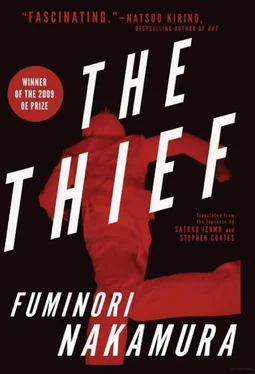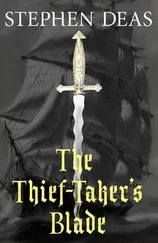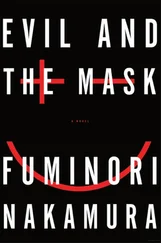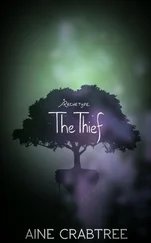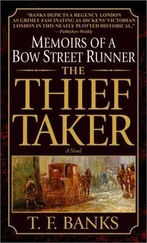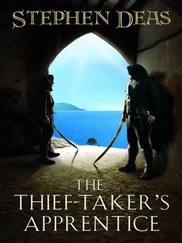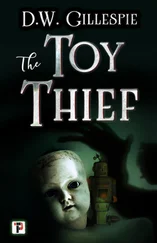He looked at my face. I braced my legs, ready to stand up quickly.
“I won’t do it.”
My throat was tight and it was hard to breathe. Seeing he was about to speak, I started to rise.
“There’s a kid you’ve made friends with recently, isn’t there? Have you already done it with the mother?”
I could dimly make out the shape of his eyes behind his sunglasses.
“As a threat, that’s kind of old-fashioned, isn’t it?”
“Old-fashioned threats are the most effective,” he said with a laugh. “You and Niimi are both pretty dumb. Even though you’ve chosen this lifestyle, you still seek attachments. That’s the height of stupidity. You’d be much better off if you were truly free. The only reason Niimi didn’t run away before the robbery was you.”
“Niimi said that?”
“I gave him a choice — either you both took part in the job and I let you live, or if either of you tried to get away I would kill you both. If he was just out for himself he’d have thought about running even if it meant risking your life.”
I went to light a cigarette, and then saw there was still one burning in the ashtray. The man was staring at the smoke rising from it.
“To put it plainly, you work for me now. You can’t refuse, because if you do, the woman and kid will die a horrible death. It’s your fate. Fate is like the relationship between the strong and the weak, don’t you think? Look at religion, for example. The Israelites, who worshipped Jehovah — why were they afraid of him? Because their god was powerful, that’s why. Everyone who believes in gods fears them to some extent. That’s because gods have power.”
He took another drink.
“Imagine that God wasn’t the creator of the world but just a superhuman with superpowers. It would still be the same, wouldn’t it? They’d obey him, worship him, pray to him for their own prosperity. I’m going to tell you a story. I’m in a good mood today.”
He made a call on his cell phone and the waiter brought more whiskey and water. Without my noticing, I had finished my drink and my glass was completely dry. Still expressionless, the waiter bowed as low as before and left. People were still cavorting in the other room.
“A long time ago, in France when they still had slavery, there was an aristocrat.”
He seemed to be getting drunk, but his swarthy complexion was unchanged. He looked at me with amusement, leaning back on the dimly-lit sofa and gesturing with his hands as he spoke.
“A thirteen-year-old boy was bought as a servant for the nobleman’s castle. A beautiful boy. The nobleman was bored with life and looking for excitement. He spent his fortune freely and acquired whatever money could buy. He slept with different women almost every day. He lived like a king with power, fame, everything he could possibly desire.”
He paused for breath.
“The nobleman looked at the youth and thought that he would try to prescribe his entire future. The story of his life, his joys, his sorrows, even his death, he would decide it all. Like Abraham and Moses, who were always under God’s control. For one year he observed the boy’s personality and abilities, forming a general impression of how he would react if the nobleman did this or that. He took some paper and started to write down the young man’s life from that point on. It took him several days to write. The book outlined the young man’s fate. What was in that book could not be changed. The boy would have to live his life exactly as it was written there.”
Circles of orange light reflected off the man’s shades.
“When the boy was fifteen he met a girl he liked, but before they could get together she was moved to a faraway place. They parted with floods of tears, like in a B-grade movie. It was the nobleman who’d brought the girl close to the boy, and of course it was he who separated them.
“At eighteen the boy was given permission to visit his parents, who were serfs, for one day only, but on that day the family was attacked by outlaws. Naturally that was all according to the nobleman’s instructions, and had been written in his book beforehand. The boy’s parents were slaughtered before his eyes. Apparently the noble spent the whole day sitting in his chair, heart pounding — not out of horror at what he was doing, but because he was worried that the brigands he’d hired might kill the boy by mistake. In his fury and heartbreak the young man’s face lost its innocence.
“Then he was invited to learn swordsmanship with the noble’s private army. It was impossible for a slave to become a knight, but he could go into battle. He could also join the pursuit of bandits. The youth became skillful with a sword. Of course the commander was also following the nobleman’s orders. During the day the boy worked as a servant in the castle and at night he practiced the art of the sword, because in that wound that would never heal he had found his reason for living. Like Job when he was being tested by the Lord, he never cried out, why is this happening to me? He didn’t realize that he was being manipulated by the nobleman.
“His master had also written many of the minor events in his life in advance. For example, he was seduced by a female servant and slept with her. The steward was going to punish him, but he was saved by a pardon from the nobleman. At that, the young man swore even greater loyalty. Even the trivial details of his day-to-day life occurred exactly as was in the notebook — the mistakes he made in his duties as a servant, the small rewards he received.
“At twenty-three he reached the high point of his life. In other words, the climax of the book. He took part in an outlaw hunt and found himself face to face with the men who murdered his parents. The captain ordered him to finish them off. Amusing, isn’t it? With tears in his eyes, the young man killed the bandits. At twenty-six he married a woman slave on the nobleman’s command, but she had such a troubled personality that he soon tired of her. Once again he was seduced, starting an affair with the nobleman’s mistress, often meeting in secret. Of course that too had all been dictated by the nobleman, just as it was written in his book. Before long the nobleman’s mistress became pregnant and the noble, who knew the whole story, casually told the young man that out of all of his children he wanted to make this one his heir. The youth was troubled and afraid.
“The noble even wrote a banquet scene in which the young man was waiting at table on a crowd of aristocrats. The mistress seemed to be on the verge of making a full confession but then changed her mind at the last minute. The nobleman was vastly entertained. And then, when the young man turned thirty, the nobleman summoned him to his chamber.”
He stopped. I had a slight ringing in my ears and the revolving shadow of the ceiling fan was bothering me. He spoke briefly into his cell phone. I continued to smoke, and the man drank his whiskey.
“The nobleman handed the youth a bundle of papers bound with string. When he opened the pages, he saw his whole life until that point recorded there. It was what the nobleman had written some fifteen years before. It must have been a terrible shock when he saw it. At the end of the story, he was to be put to death in front of the nobleman for the crime of laying his hands on the mistress, even though that crime had of course been staged by the nobleman himself.
“The young man collapsed on the floor. It took him a long time to fit all the pieces together. At the instant he understood everything and looked up at the nobleman, trembling with emotion, the soldier standing behind him stabbed him in the back. I have no idea what thoughts were going through the young man’s head before he died, but the nobleman was quivering with delight. He was enjoying an overwhelming pleasure, quite unlike fortune, fame, the joy of being with a woman. The nobleman savored that pleasure with a serious expression, as if transfixed, forgetting even to laugh.”
Читать дальше
